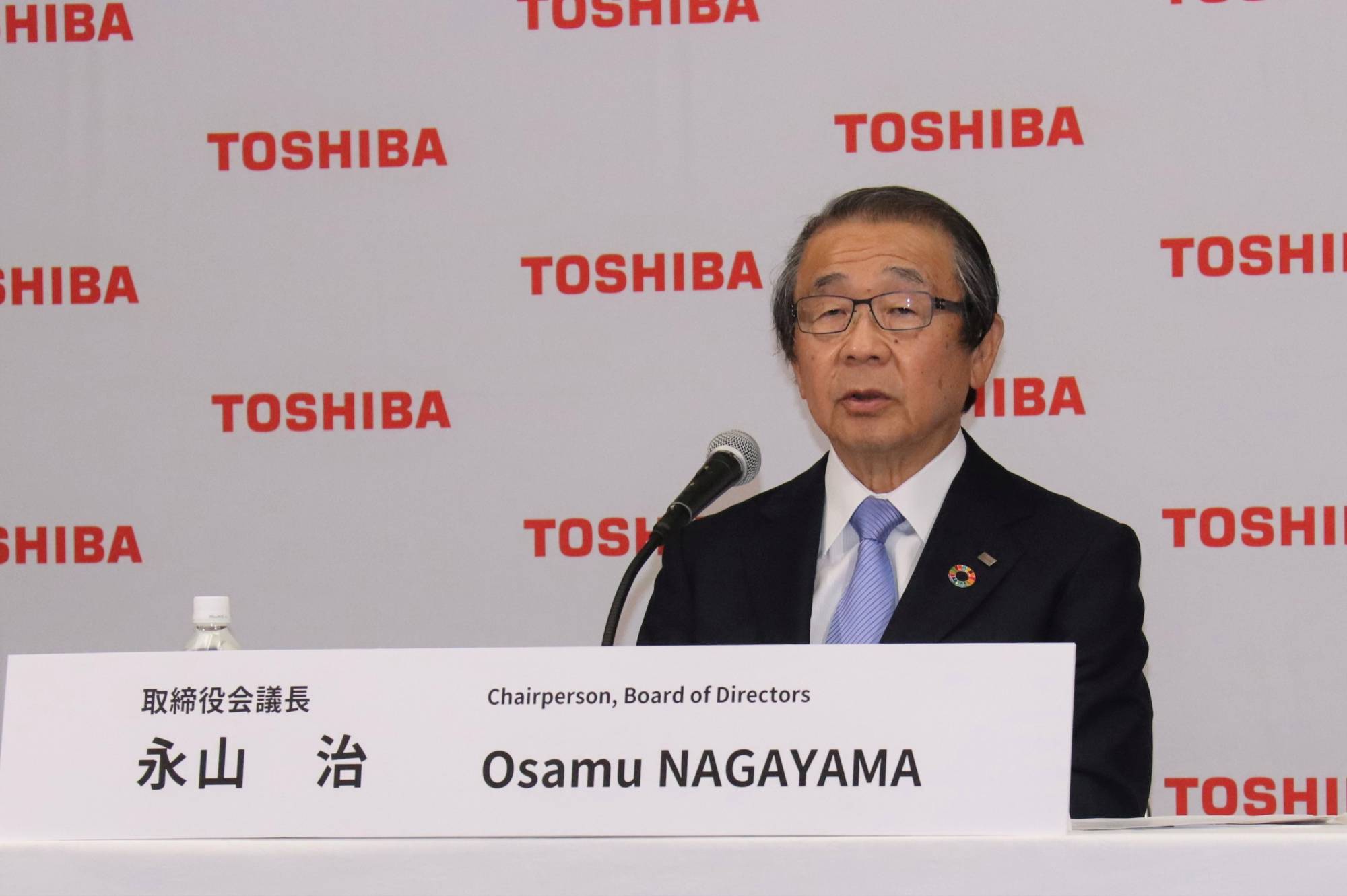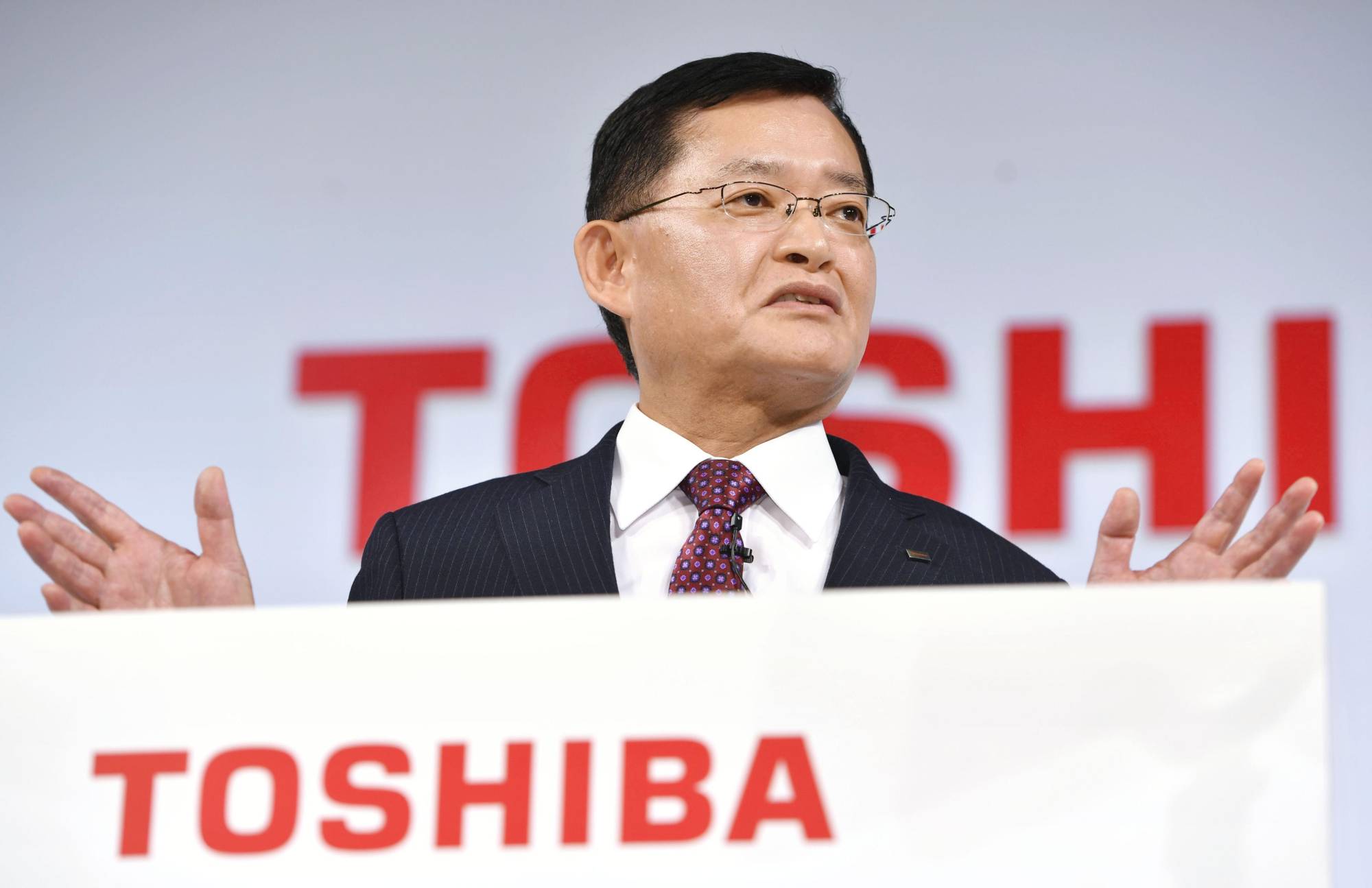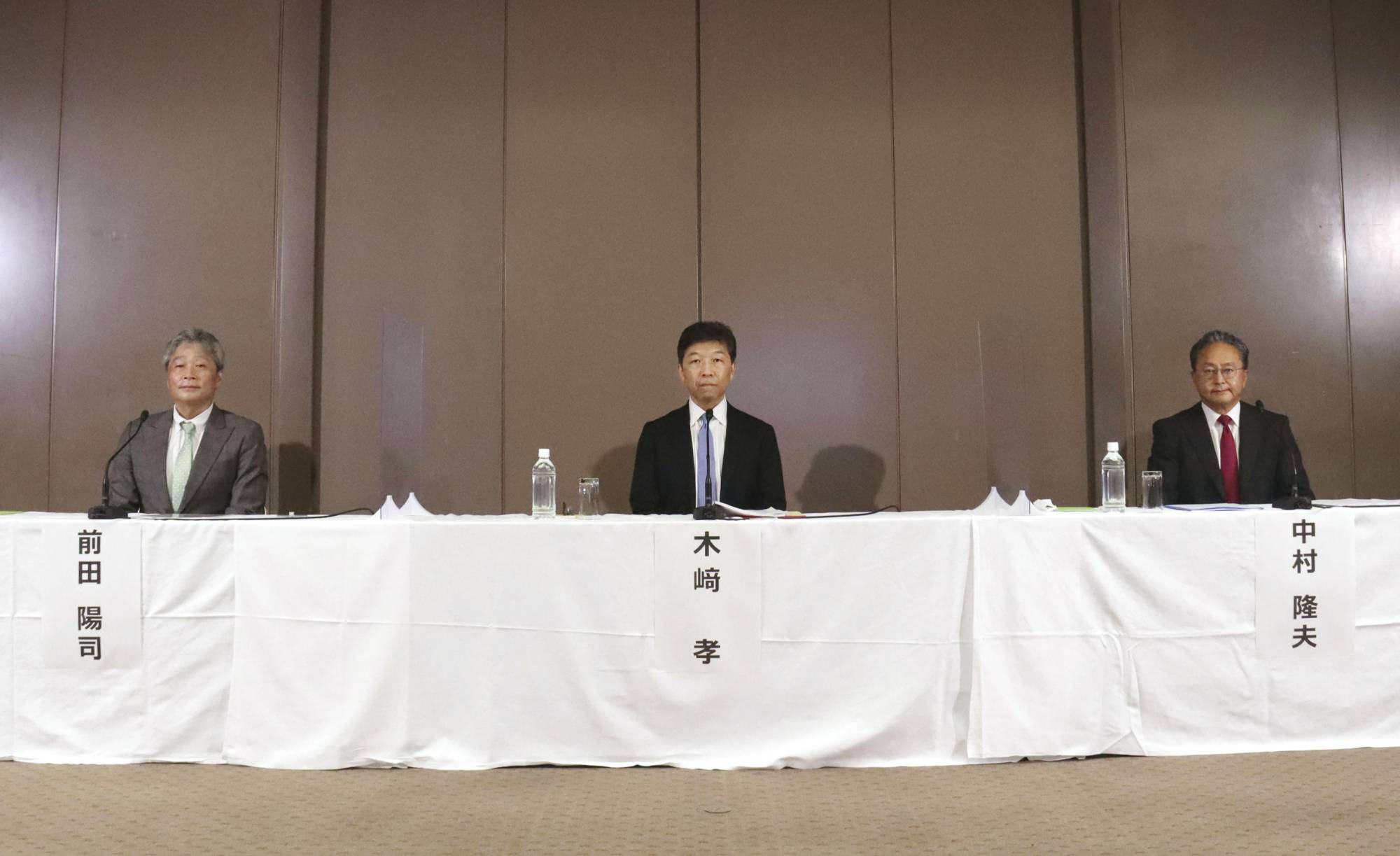Japanese companies have never been good at dealing with activist shareholders, but Toshiba Corp. appears to have taken that fight up several notches by colluding with the government to fend off activists’ influence.
This time, the industrial giant may have gone too far, and the scandal has raised key questions about the firm’s governance.
Now, an annual general shareholders meeting on Friday is set to be a showdown between Toshiba’s board of directors, who are pushing to retain their chairman, Osamu Nagayama, and investors who want him out.
Concerns over corporate governance are not new at the firm.
Toshiba vowed to revamp its governance following a shocking case of accounting malpractice in 2015. From fiscal 2009 to 2014, Toshiba made a series of inappropriate accounting entries that showed ¥152 billion ($1.3 billion) profit. A probe found the firm’s top executives, including three former presidents, were involved in the manipulation and there were no internal systems in place to stop them.
Analysts point out that the latest scandal highlights Toshiba’s failure to reform its governance after all, even though it had appointed a CEO from outside the firm and ensured a majority of its board would consist of outside directors to tighten management oversight.
“Toshiba’s revamp efforts in the past three years or so have been quite superficial,” said Yoshiharu Izumi, senior analyst at SBI Securities. Given that the root of Toshiba’s internal problem goes back more than a decade, “it’s unrealistic that it can be solved in just a year or two.”
In 2018, former Sumitomo Mitsui banker Nobuaki Kurumatani became the first CEO hired from outside the firm in nearly five decades, pledging to “inject a soul into the governance reform.”
But Kurumatani was “unable to fundamentally change and strengthen Toshiba,” Izumi said.

According to a recent report compiled by independent lawyers, Kurumatani himself was heavily involved in the attempt by Toshiba and the government to sway voting behaviors of foreign investors for an annual shareholders meeting in July 2020.
Japan’s Corporate Governance Code states “companies should take appropriate measures to fully secure shareholder rights and develop an environment in which shareholders can exercise their rights appropriately and effectively.”
Kurumatani abruptly resigned in April after a preliminary buyout offer from CVC Capital Partners drew criticisms of conflict of interest. Kurumatani used to serve as Asia chief at CVC before he became Toshiba president, fueling speculation that it was a move to secure his position, as Kurumatani was losing support from both investors and Toshiba employees. Kurumatani stressed that he was stepping down because he had done his part in Toshiba’s rehabilitation.
At one time, Toshiba was seen as a model of corporate governance. In 2003, the firm shifted to a committee-based governance system, which supposedly enhanced the monitoring of management — a rare move for a Japanese firm.
But the 2015 accounting scandal exposed that it was a mere facade, as Toshiba had been doctoring profit since fiscal 2009.
From there, Toshiba’s businesses went through a period of financial struggle.
In 2017, it faced a debacle with troubled Westinghouse Electric Co., its U.S. nuclear unit at the time. The conglomerate was forced to sell off a number of its businesses including medical and chip units to keep itself afloat and raise ¥600 billion through foreign investors. This brought in activist investors, such as Effissimo Capital Management, who have not been satisfied with Toshiba’s performance.



In an apparent aim to fend off their pressure, Kurumatani and other executives sought help from the Ministry of Economy, Trade and Industry.
The report by the independent lawyers concluded that Toshiba’s general shareholders meeting held in July last year was not conducted fairly because Toshiba and METI made inappropriate attempts to influence foreign investors.
The ministry allegedly tried to persuade Singapore-based Effissimo Capital Management not to make its own proposal for director candidates by implying that the Japanese regulator might intervene, since Toshiba, which has nuclear- and defense-related businesses, is an important firm in terms of national security. The report also said a METI adviser communicated with a Harvard University endowment fund in order to influence its vote.
Industry minister Hiroshi Kajiyama, however, told reporters that the ministry did not engage in any wrongdoing, saying the report has a number of errors.
“It is natural to have interest in technologies and industries vital to the country, so naturally, our officials at divisions overseeing such industries communicate with (companies)” designated by the Foreign Exchange and Foreign Trade Act, Kajiyama said.
But Toshiba has effectively admitted what was stated in the report and said it plans to investigate further.
“This is such an embarrassing incident from an international perspective. …Toshiba is one of Japan’s major companies and the idea that it was engaged in such an act really hurts trust in Japan’s corporate governance,” said Takaaki Wakasugi, the head of the Japan Corporate Governance Research Institute.



While foreign investors are often labeled “activists,” drawing attention when they are in conflict with Japanese firms, they are behaving as they do to increase the company’s performance, he said.
“They are being critical because Japanese companies are doing something wrong. If they are doing it right, they wouldn’t bother,” Wakasugi said.
With the fresh scandal fanning the flames, more turbulence is expected at Toshiba’s annual general shareholders meeting on Friday. The focus is on whether Nagayama, the current board chairman, and other director candidates Toshiba is proposing will be approved by shareholders, some of whom see the board as being accountable for failing to prevent the attempt to collude with the government.
Toshiba’s second biggest shareholder, 3D Investment Partners, reportedly demanded that Nagayama resign earlier this month.
Institutional Shareholder Services Inc., a U.S.-based corporate governance consultancy, recommended that shareholders reject Toshiba’s proposal to reappoint four directors and Nagayama as chairman, according to media reports.
Reuters has reported that Nagayama will likely secure the reappointment by a thin margin, citing two anonymous sources familiar with the matter.
Nagayama has said he wants to fulfill his responsibility by helping the company get through a difficult time.
Izumi of SBI Securities noted that Toshiba will continue to have a tough road ahead even if it successfully rides out the confrontation with investors on Friday, saying that the biggest challenge is to draft a midterm business plan that the firm will announce in October.
“Toshiba needs to come up with a plan that can convince both employees and investors,” he said.
In a time of both misinformation and too much information, quality journalism is more crucial than ever.
By subscribing, you can help us get the story right.
SUBSCRIBE NOW


